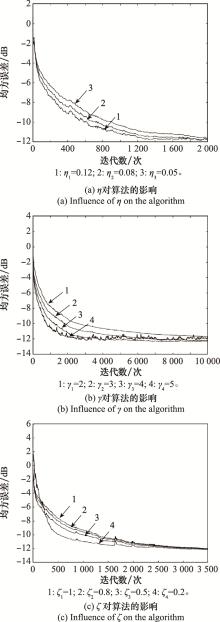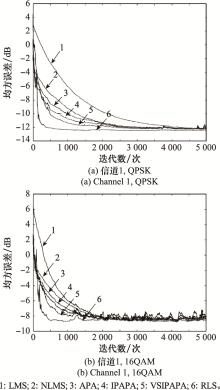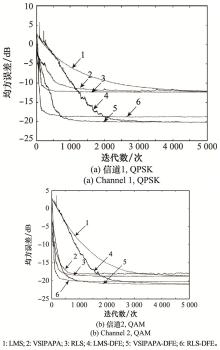| 1 |
冯玮. 浅海环境中模基盲信道估计方法研究[D]. 杭州: 浙江大学, 2019.
|
|
FENG W. Acoustic model-based blind channel estimation in shallow water environments[D]. Hangzhou: Zhejiang University, 2019.
|
| 2 |
XU T Z , XU L F . Digital underwater acoustic communications[M]. Beijing: China Ocean Press, 2010.
|
| 3 |
KILFOYLE D B , BAGGEROER A B . The state of the art in underwater acoustic telemetry[J]. IEEE Journal of Oceanic Engineering, 2000, 25 (1): 4- 27.
doi: 10.1109/48.820733
|
| 4 |
CHITRE M A , SHAHABUDEEN S , STOJANOVIC M . Underwater acoustic communications and networking: recent advances and future challenges[J]. Marine Technology Society Journal, 2008, 42 (1): 103- 116.
doi: 10.4031/002533208786861263
|
| 5 |
PELEKANAKIS K, CHITRE M. Comparison of sparse adaptive filters for underwater acoustic channel equalization/estimation[C]//Proc. of the IEEE International Conference on Communication System, 2010: 395-399.
|
| 6 |
ZHANG Y L , WANG H B , TAI Y P , et al. Non-uniform l21-norm constraint based underwater acoustic channel adaptive estimation[J]. Applied Acoustics, 2021, 172, 107613- 107624.
doi: 10.1016/j.apacoust.2020.107613
|
| 7 |
MAHESHWARI J , GEORGE N V . Robust modeling of acoustic paths using a sparse adaptive algorithm[J]. Applied Acoustics, 2016, 101, 122- 126.
doi: 10.1016/j.apacoust.2015.08.013
|
| 8 |
GUI G, PENG W, ADACHI F. Improved adaptive sparse channel estimation based on the least mean square algorithm[C]//Proc. of the IEEE Wireless Communications and Networking Conference, 2013: 3130-3134.
|
| 9 |
WU F Y , ZHOU Y H . Estimation algorithm for sparse channels with gradient guided p-norm like constraints[J]. Journal of Communication, 2014, 35, 172- 177.
|
| 10 |
ZHANG Y W , XIAO S , SUN D J , et al. Low-complexity l0-norm penalized shrinkage linear and widely linear affine projection algorithms[J]. Circuits, Systems, and Signal Processing, 2017, 36 (8): 3385- 3408.
doi: 10.1007/s00034-016-0465-6
|
| 11 |
PELEKANAKIS K , CHITRE M . New sparse adaptive algorithm based on the natural gradient and the l0-norm[J]. IEEE Journal of Oceanic Engineering, 2013, 38, 323- 332.
doi: 10.1109/JOE.2012.2221811
|
| 12 |
GLENTIS G O . An efficient implementation of the memory improved proportionate affine projection algorithm[J]. Signal Processing, 2016, 118, 25- 35.
doi: 10.1016/j.sigpro.2015.06.005
|
| 13 |
HUANG F Y , ZHANG J S . A family of gain-combined proportionate adaptive filtering algorithms for sparse system identification[J]. Digital Signal Processing, 2017, 70, 49- 58.
doi: 10.1016/j.dsp.2017.07.009
|
| 14 |
LI Y S , WANG Y Y , YANG R , et al. A soft parameter function penalized normalized maximum correntropy criterion algorithm for sparse system identification[J]. Entropy, 2017, 19 (1): 45- 51.
doi: 10.3390/e19010045
|
| 15 |
WU F Y , TONG F . Non-uniform norm constraint LMS algorithm for sparse system identification[J]. IEEE Communication Letters, 2013, 17 (2): 385- 388.
doi: 10.1109/LCOMM.2013.011113.121586
|
| 16 |
ZHANG Y W , XIAO S , HUANG D F , et al. l0-norm penalised shrinkage linear and widely linear LMS algorithms for sparse system identification[J]. IET Signal Processing, 2017, 11 (1): 86- 94.
doi: 10.1049/iet-spr.2015.0218
|
| 17 |
张殿伦, 肖爽, 张友文, 等. 基于稀疏时变水声信道的判决反馈均衡算法[J]. 哈尔滨工程大学学报, 2019, 40 (5): 892- 897.
|
|
ZHANG D L , XIAO S , ZHANG Y W , et al. Decision feedback equalization algorithm based on sparse and time-varying underwater acoustic channel[J]. Journal of Harbin Engineering University, 2019, 40 (5): 892- 897.
|
| 18 |
文昊翔, 陈隆道, 蔡忠法. 改进仿射投影算法及其在电子回声消除中的应用[J]. 电子学报, 2012, 40 (6): 1229- 1235.
|
|
WEN H X , CHEN L D , CAI Z F . A improved affine projection algorithm and its application in network echo cancellation[J]. Acta Electronica Sinica, 2012, 40 (6): 1229- 1235.
|
| 19 |
PALEOLOGU C , CIOCHINA S , BENESTY J . An efficient proportionate affine projection algorithm for echo cancellation[J]. IEEE Signal Process Letters, 2010, 17, 165- 168.
doi: 10.1109/LSP.2009.2035665
|
| 20 |
PALEOLOGU C, BENESTY J, ALBU F. Regularization of the improved proportionate affine projection algorithm[C]//Proc. of the IEEE International Conference on Acoustics, Speech and Signal Processing, 2012: 169-172.
|
| 21 |
ZHAO H Q , YU Y , GAO S B , et al. Memory proportionate APA with individual activation factors for acoustic echo cancella-tion[J]. IEEE Trans.on Audio Speech and Language Processing, 2014, 22 (6): 1047- 1055.
doi: 10.1109/TASLP.2014.2318519
|
| 22 |
YANG Z , ZHENG Y R , GRANT S L . Proportionate affine projection sign algorithms for network echo cancellation[J]. IEEE Trans.on Audio Speech and Language Processing, 2011, 19 (8): 2273- 2284.
doi: 10.1109/TASL.2011.2125955
|
| 23 |
JIANG W H , TONG F . Exploiting dynamic sparsity for time reversal underwater acoustic communication under rapidly time varying channels[J]. Applied Acoustics, 2021, 172, 107648- 107653.
doi: 10.1016/j.apacoust.2020.107648
|
| 24 |
DINIZ P S R . Adaptive filtering: algorithms and practical implementation[M]. 4th ed Berlin: Springer, 2013.
|
| 25 |
SIMON H . Adaptive filter theory[M]. 5th ed Upper Saddle River, NJ: Prentice Hall, 2013.
|
| 26 |
CHEN F , LI X , DUAN S , et al. Diffusion generalized maximum correntropy criterion algorithm for distributed estimation over multitask network[J]. Digital Signal Processing, 2018, 81, 16- 25.
doi: 10.1016/j.dsp.2018.02.008
|
| 27 |
ZHAO J , ZHANG H B , WANG G . Fixed-point generalized maximum correntropy: convergence analysis and convex combination algorithms[J]. Signal Processing, 2019, 154, 64- 73.
doi: 10.1016/j.sigpro.2018.06.012
|
| 28 |
宁小玲, 刘忠, 罗亚松, 等. 水声信道快速收敛自适应算法[J]. 系统工程与电子技术, 2010, 32 (12): 2524- 2527.
doi: 10.3969/j.issn.1001-506X.2010.12.07
|
|
NING X L , LIU Z , LUO Y S , et al. Fast convergence adaptive equalization algorithm for underwater acoustic channels[J]. Systems Engineering and Electronics, 2010, 32 (12): 2524- 2527.
doi: 10.3969/j.issn.1001-506X.2010.12.07
|
| 29 |
ZEOLLA D , ANTOMNO A , BOSCO G , et al. DFE versus MLSF electronic equalization for gigabit/s SI-POF transmission systems[J]. IEEE Photonics Technology Letters, 2011, 23 (8): 510- 515.
doi: 10.1109/LPT.2011.2113316
|
| 30 |
宁小玲, 张林森, 刘志坤. 基于自适应混合能量参数的变步长LMS水声信道均衡算法[J]. 系统工程与电子技术, 2015, 37 (9): 2141- 2147.
|
|
NING X L , ZHANG L S , LIU Z K . Variable step size LMS equalization algorithm based on adaptive mixed-power parameter in underwater acoustic channels[J]. Systems Engineering and Electronics, 2015, 37 (9): 2141- 2147.
|
| 31 |
罗亚松. 水下组织网络物理层关键技术与实验研究[D]. 武汉: 海军工程大学, 2010.
|
|
LUO Y S. Research on key techniques and according experiments of physical layer in underwater self-organizing network[D]. Wuhan: Naval University of Engineering, 2010.
|





